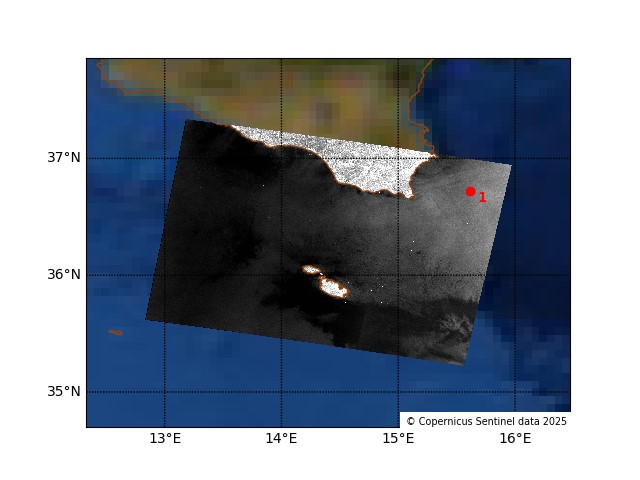Protection of the sea and coasts from pollution in Italy
Italian Ministry of the Environment and the Security Energy
(
Government
)
#OceanAction58795
Description
The Italian Ministry of the Environment is at the forefront of the fight against hydrocarbon pollution at sea, following spills, through the implementation of a series of prevention and response measures involving the Italian Coast Guard, for the part of surveillance at sea and for the local response, and the company E-GEOS for satellite surveillance. Through additional funding, the Ministry is implementing an enhancement of the surveillance operated by the Italian Coast Guard at sea, both on marine protected areas and on oil platforms. This surveillance is carried out through naval, and air means of Italian Coast Guard. Satellite surveillance at sea is guaranteed by a contract with the company E-GEOS, which provides daily near real time images of potential spills from oil platforms, as well as by the support of EMSA.
Ministry of the Environment and the Energy Security (Government), Italian Coast Guard (Government), E-Geos (private sector)
SDGS & Targets
Goal 14
Conserve and sustainably use the oceans, seas and marine resources for sustainable development
14.1
By 2025, prevent and significantly reduce marine pollution of all kinds, in particular from land-based activities, including marine debris and nutrient pollution
14.1.1
(a) Index of coastal eutrophication; and (b) plastic debris density
14.2
By 2020, sustainably manage and protect marine and coastal ecosystems to avoid significant adverse impacts, including by strengthening their resilience, and take action for their restoration in order to achieve healthy and productive oceans
14.2.1
Number of countries using ecosystem-based approaches to managing marine areas
14.3
Minimize and address the impacts of ocean acidification, including through enhanced scientific cooperation at all levels
14.3.1
14.4
By 2020, effectively regulate harvesting and end overfishing, illegal, unreported and unregulated fishing and destructive fishing practices and implement science-based management plans, in order to restore fish stocks in the shortest time feasible, at least to levels that can produce maximum sustainable yield as determined by their biological characteristics
14.4.1
14.5
By 2020, conserve at least 10 per cent of coastal and marine areas, consistent with national and international law and based on the best available scientific information
14.5.1
14.6
By 2020, prohibit certain forms of fisheries subsidies which contribute to overcapacity and overfishing, eliminate subsidies that contribute to illegal, unreported and unregulated fishing and refrain from introducing new such subsidies, recognizing that appropriate and effective special and differential treatment for developing and least developed countries should be an integral part of the World Trade Organization fisheries subsidies negotiation
14.6.1
Degree of implementation of international instruments aiming to combat illegal, unreported and unregulated fishing
14.7
By 2030, increase the economic benefits to Small Island developing States and least developed countries from the sustainable use of marine resources, including through sustainable management of fisheries, aquaculture and tourism
14.7.1
Sustainable fisheries as a proportion of GDP in small island developing States, least developed countries and all countries
14.a
Increase scientific knowledge, develop research capacity and transfer marine technology, taking into account the Intergovernmental Oceanographic Commission Criteria and Guidelines on the Transfer of Marine Technology, in order to improve ocean health and to enhance the contribution of marine biodiversity to the development of developing countries, in particular small island developing States and least developed countries
14.a.1
14.b
Provide access for small-scale artisanal fishers to marine resources and markets
14.b.1
Degree of application of a legal/regulatory/policy/institutional framework which recognizes and protects access rights for small‐scale fisheries
14.c
Enhance the conservation and sustainable use of oceans and their resources by implementing international law as reflected in United Nations Convention on the Law of the Sea, which provides the legal framework for the conservation and sustainable use of oceans and their resources, as recalled in paragraph 158 of "The future we want"
14.c.1
Number of countries making progress in ratifying, accepting and implementing through legal, policy and institutional frameworks, ocean-related instruments that implement international law, as reflected in the United Nations Convention on the Law of the Sea, for the conservation and sustainable use of the oceans and their resources
SDG 14 targets covered
| Name | Description |
|---|---|
| 14.1 | By 2025, prevent and significantly reduce marine pollution of all kinds, in particular from land-based activities, including marine debris and nutrient pollution |
| 14.5 | By 2020, conserve at least 10 per cent of coastal and marine areas, consistent with national and international law and based on the best available scientific information |
| 14.a | Increase scientific knowledge, develop research capacity and transfer marine technology, taking into account the Intergovernmental Oceanographic Commission Criteria and Guidelines on the Transfer of Marine Technology, in order to improve ocean health and to enhance the contribution of marine biodiversity to the development of developing countries, in particular small island developing States and least developed countries |
| 14.c | Enhance the conservation and sustainable use of oceans and their resources by implementing international law as reflected in United Nations Convention on the Law of the Sea, which provides the legal framework for the conservation and sustainable use of oceans and their resources, as recalled in paragraph 158 of "The future we want" |
Deliverables & Timeline
Resources mobilized
Partnership Progress

Feedback
Action Network

Timeline
Entity
SDGs
Other beneficiaries
Ocean Basins
Communities of Ocean Action
More information
Countries

Contact Information
Emanuela , Dr.

